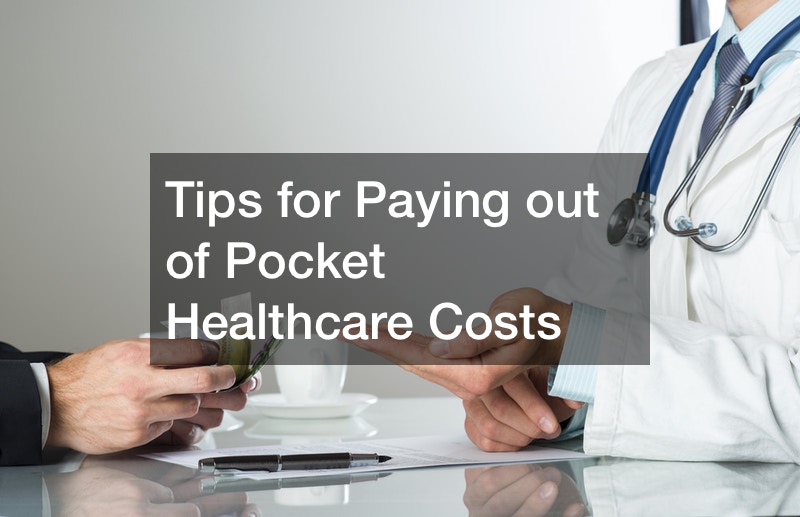

The cost of health care has been steadily rising each year, sometimes in staggering leaps. Combined with a sluggish economy, this is causing fewer people to have enough to invest in health insurance. In addition, you get an expensive situation where more and more families struggle to keep themselves healthy. Some may even be non-disabled due to medical bills they cannot pay out of pocket. The following are tips for paying out-of-pocket healthcare costs.
Shop Around for Good Insurance Coverage
One of the tips for paying out of pocket healthcare costs is using the health insurance cover. It is crucial to get quotes from several different insurance companies. This can give you an idea about what plan is best for your family. What is important to you? Will you need dental coverage or vision disorder coverage? How much does the monthly premium cost? How does that compare with out-of-pocket costs if you got sick or injured?
There are so many options for finding affordable health insurance coverage. Ensure you get all the relevant details concerning your insurance cover. Think about your deductible. Ensure it is this something that you can afford. This includes enrolling in a Medicare insurance program. Some health plans have annual or lifetime limits on how much money they will pay for medical expenses.
This is especially true if different parts of your body need different types of treatment at other times in your life. Getting coverage year-round is one of the best things that you can do. This ensures that you can take all medical bills out of pocket. Having a good idea of what health care costs you can expect is one of the essential tips for paying out of pocket healthcare costs.
If you have an employer-sponsored health insurance plan, you need to be aware of the cost associated with this type of insurance coverage. The knowledge makes it much easier for you to deal with these expenses independently. Most employers will offer a health insurance cost calculator for employees. The calculator is used to determine how much these plans are likely to cost.
The cost is dependent on the specific type of insurance coverage provided by the employer in question. The more research you do into health insurance, the easier it will be to spend accordingly. This prepares you to pay out of pocket if something happens that requires you to use a lot of medical care.
Use a Health Care FSA to Pay for Out of Pocket Healthcare Costs
This is one of the overlooked tips for paying out of pocket healthcare costs. A flexible spending account, or FSA, is a reimbursement account attached to a high-deductible health plan. The company will put money into it on your behalf as an employee. You can use the money in it to pay for out of pocket medical costs and expenses during a family dentist appointment.
The money you do not use before the end of the year or get reimbursed for can be used to reimburse yourself in the following year. This is different from an HSA because you are not putting money into this account yourself. Instead, your company does it for you and then allows you to allocate how much goes into what category.
Many people are unaware of the tips for paying out of pocket healthcare costs. One of the least known tips is using a card to pay for health expenses like purchasing a pain ointment. An FSA debit card is a payment option offered by some of the largest flexible spending account providers. An associated money account keeps track of how much money is available in the card’s balance.
When you go to a doctor or a hospital, the medical provider will charge the card for the cost of your visit. The money is deducted from the balance on your card. Some of these cards are backed by Visa or Mastercard and can purchase at participating retailers.
Consider using Health Savings Accounts as an Investment Tool

A health savings account, or HSA, is a savings account attached to a high-deductible health plan. You can use the money you put into the budget to pay for out of pocket medical costs and expenses, and it grows tax-free until you use it. If you are eligible for an HSA, you should consider using the account in place of an interest-bearing savings account.
Using the money in your HSA for paying out of pocket healthcare costs during a visit to the ophthalmologist will not get it taxed. It is counted as a deduction. Having the money grow tax-free could be very useful in paying off other debts. This includes student loans or credit card bills. It might be tempting to spend every penny you have on one account. However, this will not help you long-term in the case of an illness or injury that could wipe you out completely.
Do not be afraid to set up a cash fund. The emergency fund can cover health expenses at the community clinic or other health facility sooner than later. Health savings accounts make sense only when persons are young and healthy or in high deductible plans. This goes along with using credit cards for cash back, points, and rewards. Using a medical credit card can save money in a lot of ways.
If you have outstanding medical bills, you can use the card’s balance transfer program to get a lower interest rate and save money. This is also a great option if you have trouble making ends meet after an illness or accident. The interest rates are usually lower than standard credit cards. Some of these cards also offer incentives like cash back or rewards points. Apply for a secured credit card to build up your credit score. This is the best way to apply for a low-interest rate card in the future.
Negotiate With the Hospital

This is one of the helpful tips for paying out of pocket healthcare costs. Negotiating with a hospital is quite simple but potentially tricky. If you plan on paying out of pocket for a hospital stay, ask how much they would reduce your bill if you paid it all at once in cash. This could potentially save you thousands of dollars.
It can also make your medical bills cheaper than they would be if you were going to pay them out of pocket over time. Maybe you have to liquidate an investment or take out a loan. However, this could well be worth it, considering how much you will save. Be thrifty with your health spending. If you get sick and do not have insurance, one of the best things you can do is make sure that the money you are spending on health care is getting paid on helping your body get better.
As you look into the tips for paying out of pocket healthcare costs, do not forget the need for healthcare credentialing. Avoid a scenario where you are just paying for physicians’ services and hospitals without getting results. This means shopping for cheap prescriptions and items like an affordable hearing aid. It also means making sure you use all the less expensive remedies before moving to more costly options like medications bought at a pharmacy.
Have Your Insurance Company Pay Your Medical Bills
One of the essential tips for paying out of pocket healthcare costs is utilizing the insurance company. Keep in mind that your company will cover some or all of your medical bills if you have a health insurance plan. You can call them and ask for help with the bills. However, it is usually a good idea to give them a heads up about what you plan to pay out of pocket on specific accounts. This helps to plan and ask for payment ahead of time.
Keeping your insurance year-round is among the ignored tips for paying out-of-pocket healthcare costs. Most employers will allow you to keep your health insurance year-round and deduct the cost from your paychecks. However, there are some exceptions. If you plan on changing jobs, this might not be something you want to do. In addition, it should not be an issue for most people.
You can also consider paying for an annual physical. Many insurance companies will cover the cost of a physical exam. They will not even require a referral from your doctor or family dentist. If you already have a doctor and feel more comfortable with them rather than going to an unfamiliar clinic, this might be a better option for you.
It is worth getting one as an investment in your health if you are young, healthy, and do not smoke. This could save you hundreds or thousands of dollars throughout your life. If you need to pay out of pocket, the cost of replacing broken or missing healthcare equipment is an expense you will have to cover. Insurance does not cover this. If your health plan has a high deductible, it is not enough to pay the medical expenses once they happen. You need to pay for whatever part of the cost is not covered by your insurance.
Find the Best Deals on Medications and Supplies

The cost of healthcare is continuing to skyrocket. However, it is not always easy for uninsured or underinsured or people with high medical needs to find affordable care. One of the tips for paying out of pocket healthcare costs is buying medications online. Generics are almost always available at a fraction of the cost of brand-name medications. You can order them without a prescription.
When shopping for medications and supplies online, ensure you find a site you trust. Do not forget about your local pharmacy’s dollar aisle. Most pharmacies carry a variety of over-the-counter medications at affordable prices. The pills work as well as expensive treatments or prescriptions. Check health food stores for natural remedies that are often inexpensive compared to others.
Get a discount on your prescription drugs by filling them while you get services for free or discounted care directly from an institution or a health plan company. Major chain pharmacies are among the most popular and respected places to fill prescriptions. They are monitored by Medicare and offer discounts and coupons to senior citizens to receive 30% off of most medications every day all year.
Take advantage of your options to get quality and affordable prescriptions and medical supplies. Order your prescriptions in bulk through an online pharmacy or other business that offers this service. This will save money on the medication and shipping costs. You will not also have to remember to get refills at retail pharmacies. People can also see a vast selection of prescription drugs at one time with the convenience and security of ordering online.
Make a Budget and Stick To It

It sounds counterintuitive, but health insurance is expensive. If you go over your allotted premium, you will be in deep financial trouble. Nothing stings like being called by a collection agency because you cannot pay the medical bills that keep piling up. If you are trying to save money for your retirement or college savings, forget about going over your allocated budget for health insurance premiums.
How will you afford to keep those hard-earned dollars if you do not have money to spare on something as trivial as health insurance premiums? Sort of like a fire extinguisher, health care insurance is meant to put out the flames that could otherwise consume you economically. However, sometimes, things get so bad that it is just not worth paying the monthly premium to keep your own life afloat.
As a result, you will need to make a financial sacrifice to stay healthy. You can only afford health insurance after you have stopped taking out your Visa card for the subway and eating takeout as soon as you get home from work. This is an essential lesson for every household. You cannot afford everything and still want to pay your bills. Likewise, you cannot always afford health insurance but still want it if the alternative is having a catastrophic illness that will sink your wallet.
The cost of healthcare is one of the most significant financial burdens that many people face. Unfortunately, they might not have the option to pay out-of-pocket for their medical services if they are on a tight budget. A few options for paying healthcare costs can help limit your out-of-pocket costs. This is especially important for those who need to reduce their expenses and still need health coverage. The tips for paying out of pocket healthcare costs listed above will help you with this.


